Many home gardeners start with garlic because it’s forgiving, low-maintenance, and delivers great results even on the first try. But here’s something many new gardeners overlook not all garlic is created equal. With hundreds of varieties to choose from, the difference between success and disappointment often comes down to picking the best garlic varieties for your climate and your taste buds.
If you’ve ever wondered why your garlic didn’t form large bulbs, or why it didn’t store well through winter, the answer might be simple: you planted the wrong kind. The key lies in understanding the two main garlic families, hardneck and softneck, and how each performs in different growing zones.
In this guide, you’ll learn:
- The difference between hardneck and softneck garlic
- Which garlic varieties grow best in each climate zone
- Which types have the strongest flavor or longest storage
- How to choose the right garlic for your garden and cooking needs
Hardneck vs. Softneck Garlic
Before we dive into specific varieties, it’s important to understand the fundamental difference between hardneck and softneck garlic. These two groups may look similar, but they behave quite differently in the garden.
Hardneck Garlic
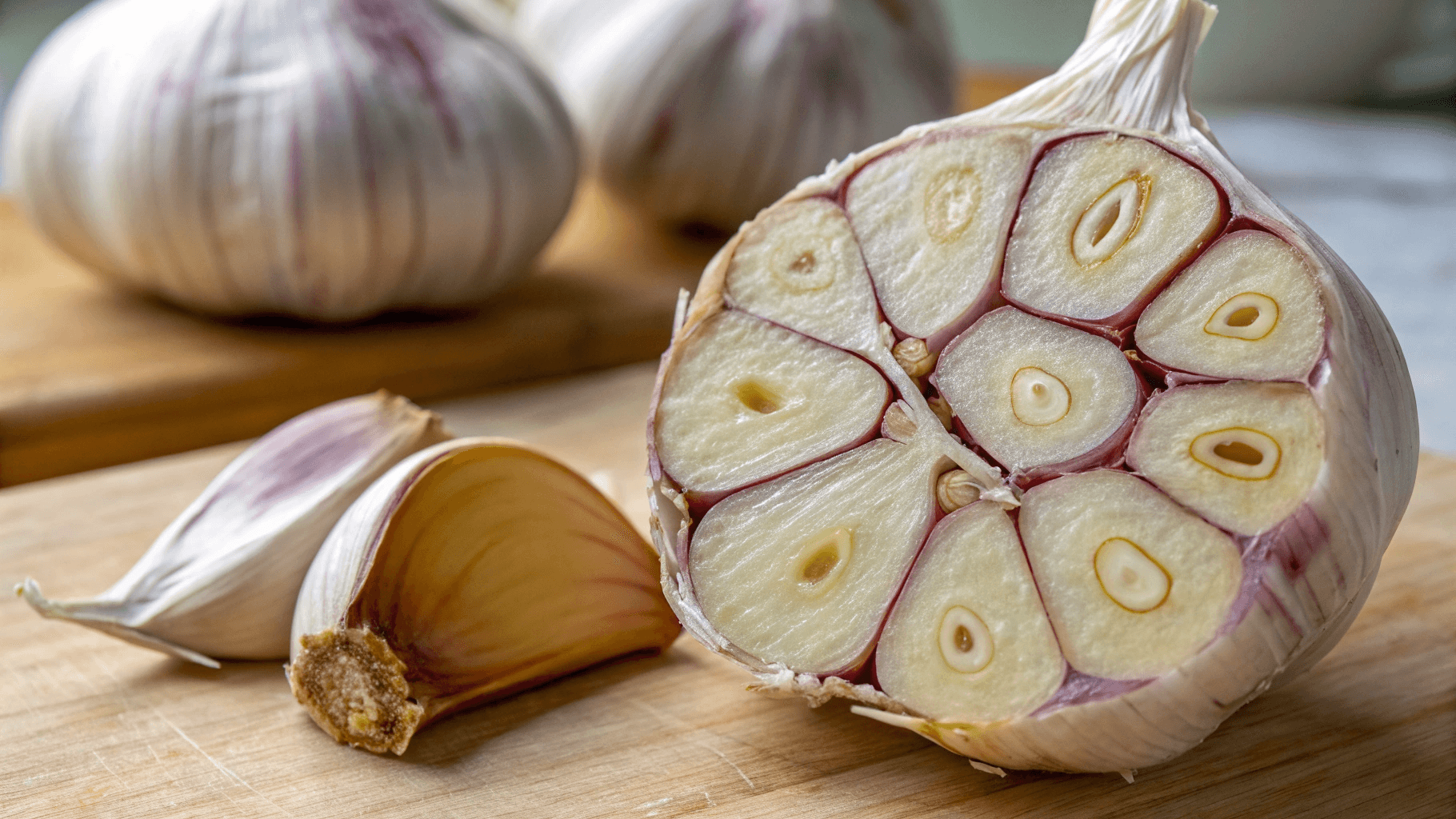
Hardneck garlic (Allium sativum var. ophioscorodon) thrives in colder climates where winters are long and frost is common. It produces a stiff central stalk, called a “scape”, that curls and grows upward in early summer. These scapes are edible and add a mild, garlicky flavor to dishes.
Hardneck varieties typically produce fewer, larger cloves, usually 4 to 10 per bulb, and their flavor is often described as more complex, spicy, and true to traditional garlic taste. However, they tend to have a shorter storage life, usually around 3 to 6 months.
Pros:
- Rich, bold flavor
- Easy to peel cloves
- Produces delicious edible scapes
- Perfect for northern gardeners
Cons:
- Doesn’t store as long
- More sensitive to warm climates
Softneck Garlic
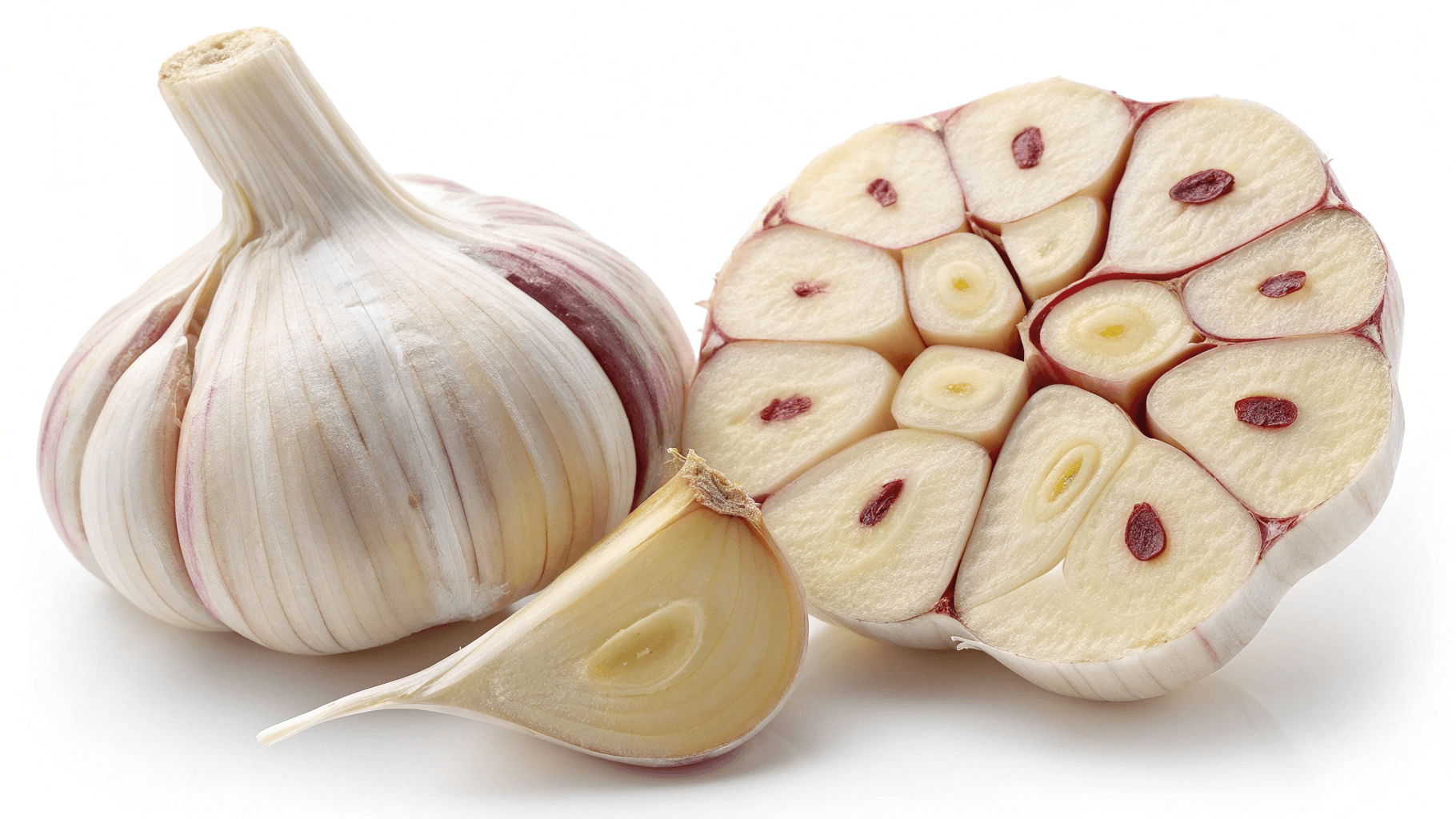
Softneck garlic (Allium sativum var. sativum) is the type you’ll often see in grocery stores. It performs best in mild climates where winters are short and the soil doesn’t freeze deeply. Instead of a central stalk, it grows soft, flexible leaves, which makes it ideal for braiding.
Softnecks produce more cloves per bulb, often 10 to 20, and they store exceptionally well, sometimes lasting up to 9 months or longer when properly cured. Their flavor is typically milder, though some varieties can surprise you with heat.
Pros:
- Long storage life
- Great for braiding and long-term keeping
- Adapts well to warmer regions
Cons:
- Harder to peel
- Lacks the strong flavor of hardneck types
| Feature | Hardneck Garlic | Softneck Garlic |
|---|---|---|
| Best climate | Cold (Zones 3-6) | Mild-warm (Zones 5-10) |
| Clove size | Large | Smaller |
| Number of cloves | Fewer (4-10) | Many (10-20) |
| Flavor | Strong, complex | Mild to medium |
| Storage life | 3-6 months | 6-12 months |
| Produces scapes | Yes | No |
| Easy to peel | Yes | No |
Best 8 Garlic Varieties by Region and Flavor
Now that you know the basics, let’s explore some of the best garlic varieties to plant, whether you live in the frosty north or the sunny south.
1. Music (Hardneck)
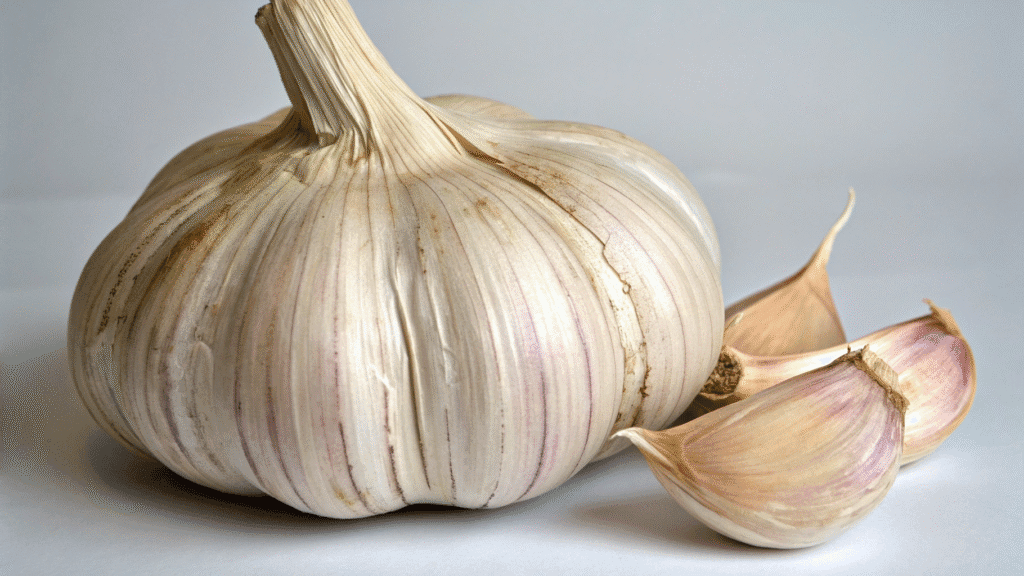
Best for: Cold climates (Zones 3-6)
Flavor: Rich, strong, and slightly sweet
Music garlic is a Canadian favorite known for its large bulbs and dependable yields. Each bulb typically holds 4 to 6 massive cloves that peel easily and store for about 5 months. It’s also one of the most forgiving hardneck types for beginners.
Growing tip: Music garlic performs best when planted in rich, well-drained soil and heavily mulched for winter protector.
2. German Extra Hardy (Hardneck)

Best for: Very cold regions (Zones 3-6)
Flavor: Bold and spicy
True to its name, this variety can handle tough winters. It produces uniform bulbs with thick, white wrappers and delivers that sharp, pungent garlic taste that chefs love. It’s a must-try if you want a traditional, full-bodied garlic.
Growing tip: German Extra Hardy thrives in very cold climates when planted early in fall and mulched heavily, allowing strong root development before winter dormancy.
3. Chesnok Red (Hardneck)
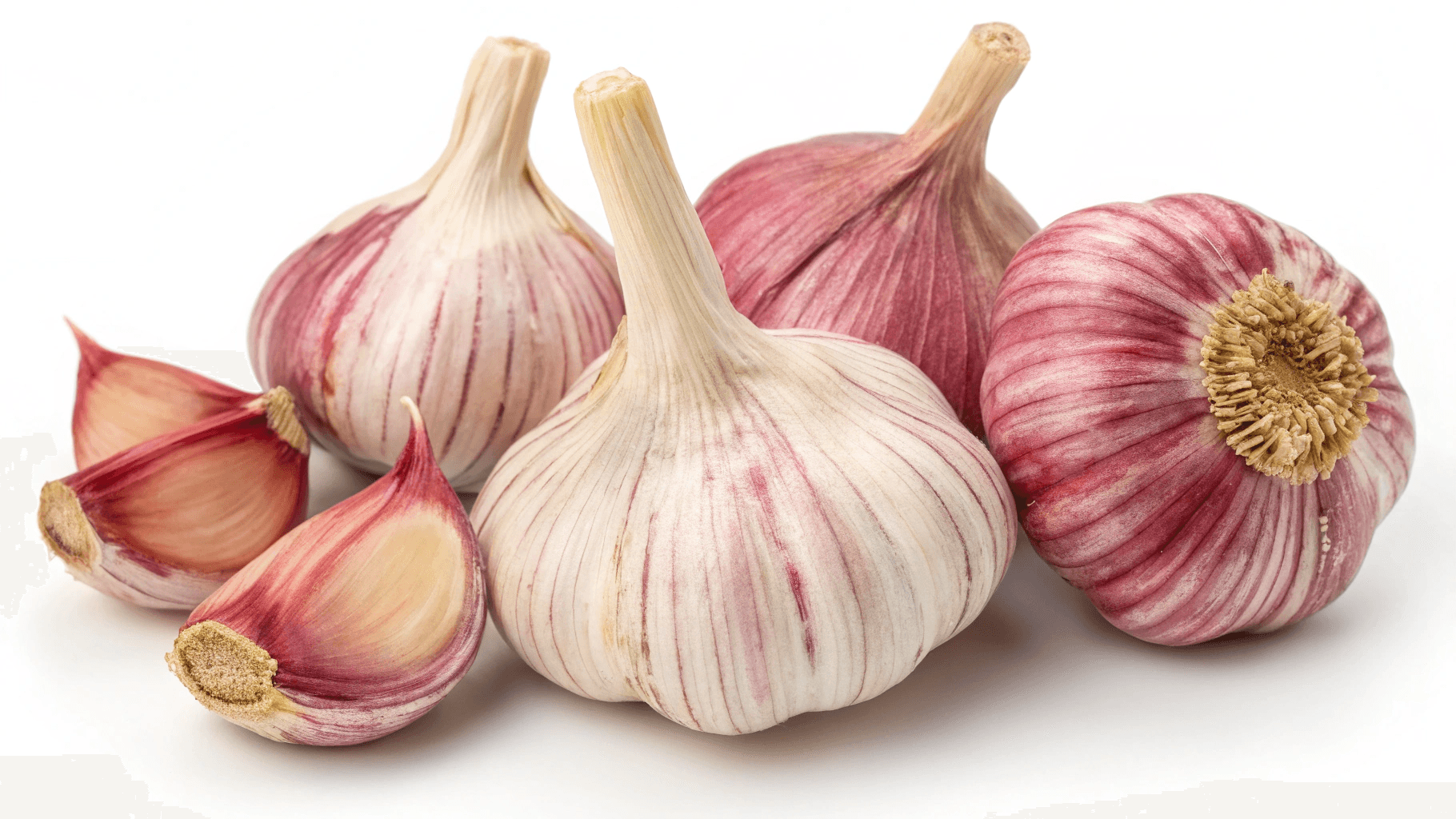
Best for: Cooler climates (Zones 4-7)
Flavor: Sweet when roasted, rich when raw
Chesnok Red, a standout from the Republic of Georgia, is known as one of the best baking garlics. It holds its shape and flavor beautifully when cooked, making it a favorite among foodies. Plus, it has a longer shelf life than most hardneck types.
Growing tip: Chesnok Red produces its best flavor when grown in full sun with steady moisture during spring growth, especially in cooler climates.
4. Rocambole (Hardneck)
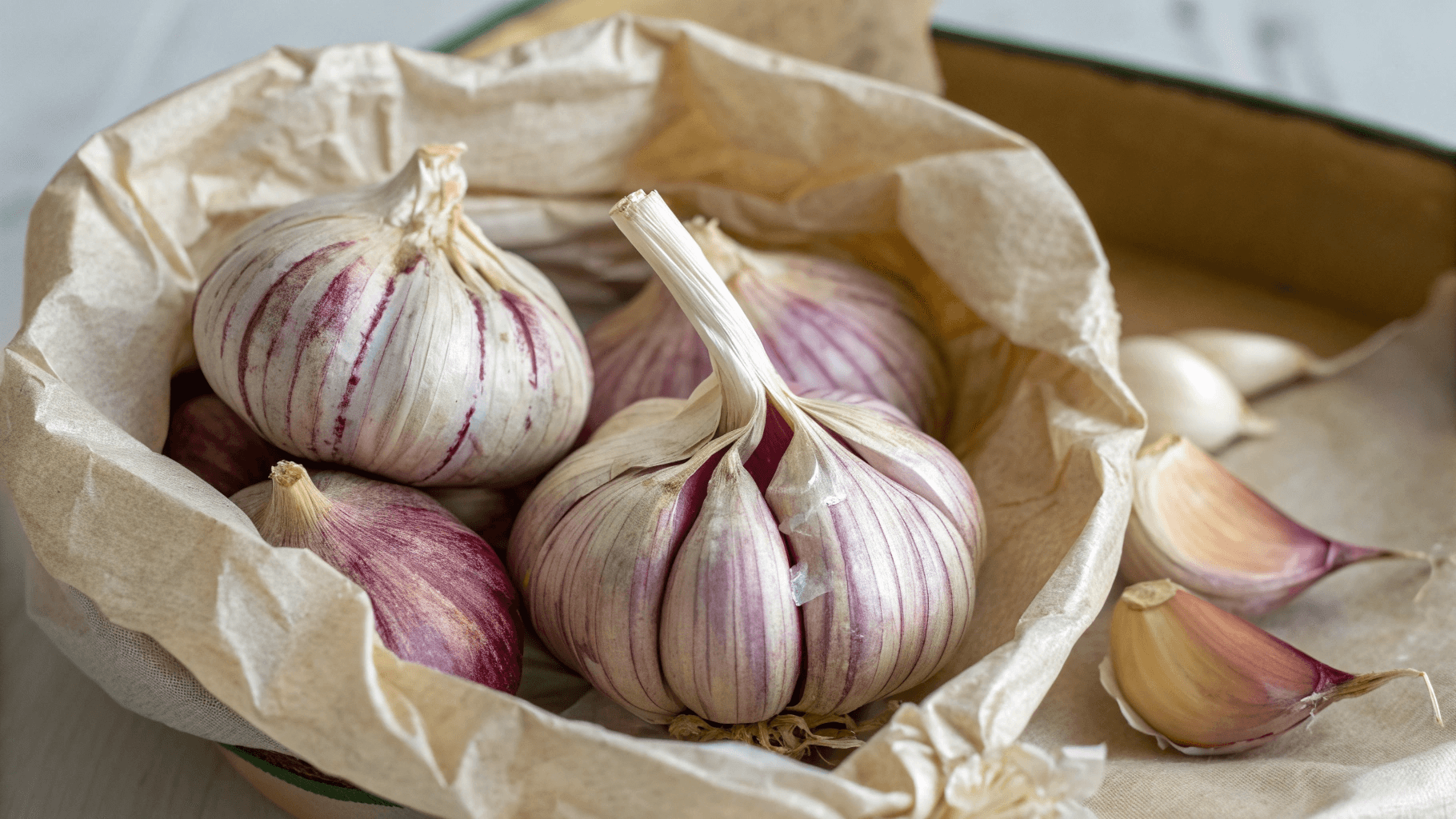
Best for: Cold regions (Zones 3-6)
Flavor: Complex, full-bodied
Rocambole varieties are renowned for their unforgettable flavor – spicy, earthy, and deep. They peel like a dream but don’t store as long, usually just 3-4 months. Grow Rocambole if you care more about taste than long-term storage.
Growing tip: Rocambole garlic prefers fertile, loose soil and consistent watering, but should be harvested promptly since it has a shorter storage life than other varieties.
5. Inchelium Red (Softneck)
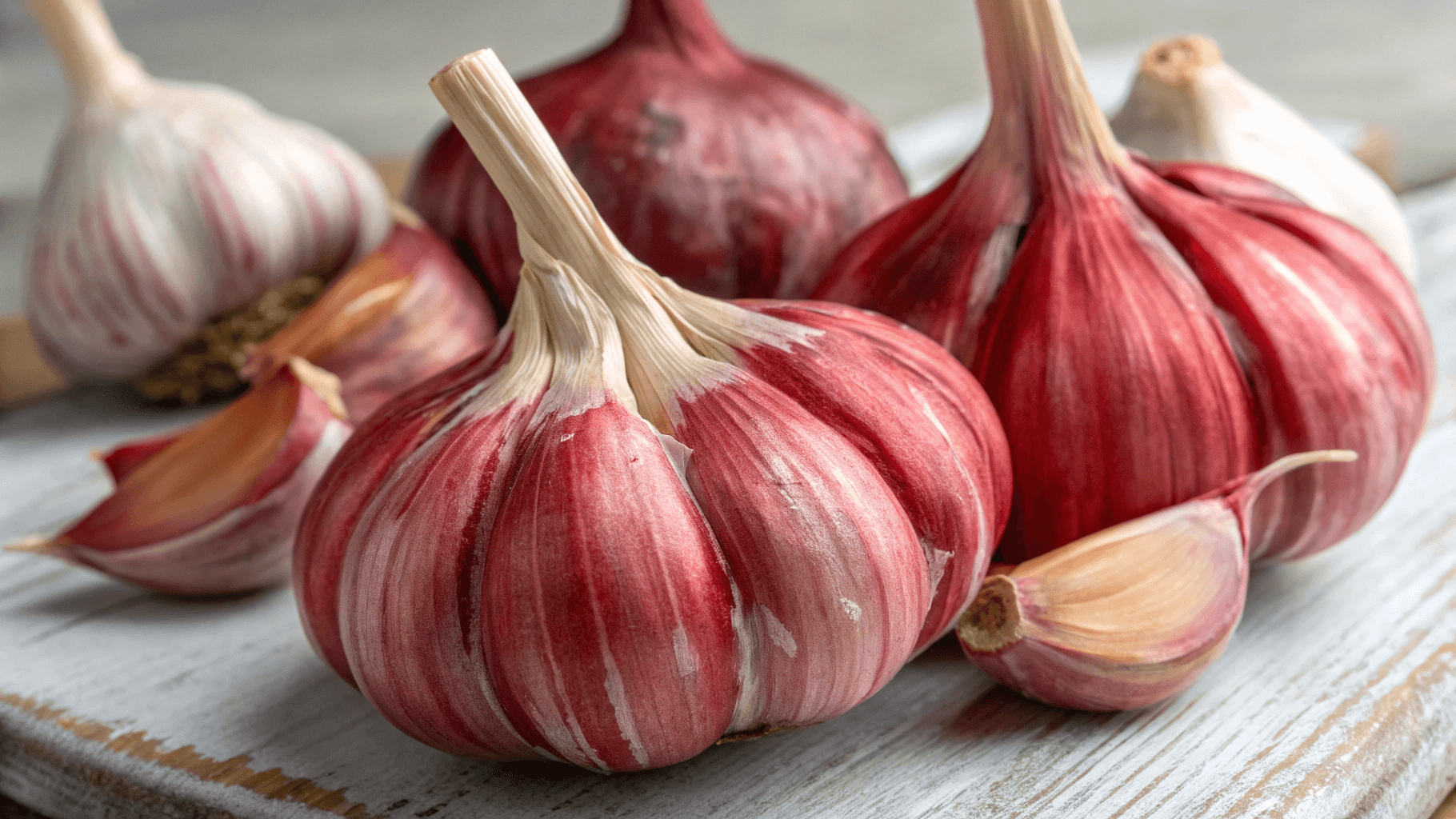
Best for: Mild climates (Zones 5-9)
Flavor: Mild, buttery, slightly sweet
Discovered on the Colville Reservation in Washington State, Inchelium Red is one of the best-tasting softneck garlics you can grow. It performs beautifully in most U.S. gardens and stores for up to 9 months when cured properly.
Growing tip: Inchelium Red grows reliably in mild climates and performs especially well when planted in well-amended soil with good drainage and regular spring feeding.
6. California Early (Softneck)
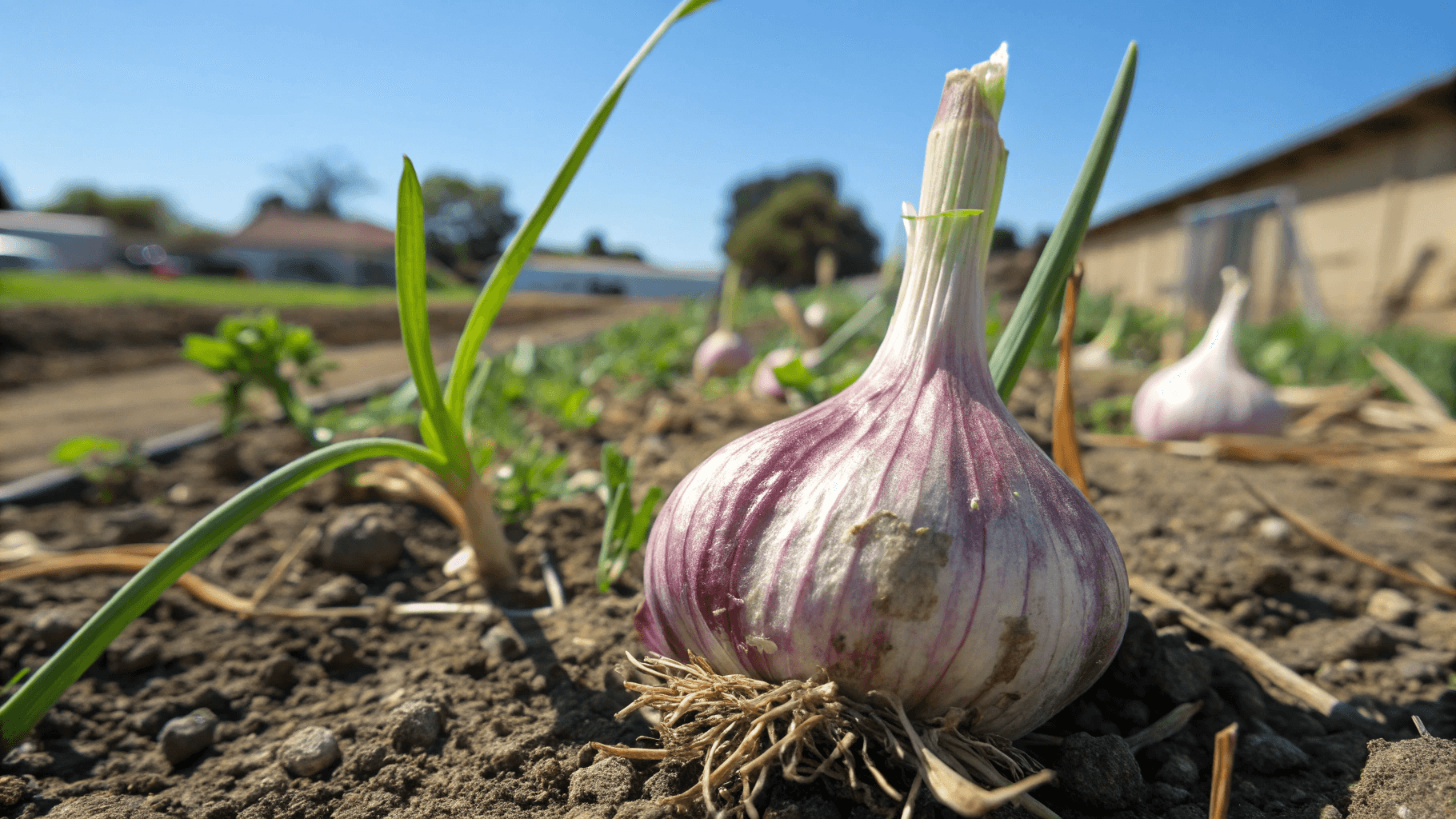
Best for: Warm climates (Zones 7-10)
Flavor: Classic, balanced garlic flavor
This is the variety you’ll often see in grocery stores, and for good reason. California Early is easy to grow, matures quickly, and has excellent storage potential. It’s ideal for southern or coastal gardeners who want consistent results.
Growing tip: California Early is ideal for warm regions and benefits from planting in loose, sandy or loamy soil to prevent bulb rot and encourage uniform growth.
7. Silver Rose (Softneck)
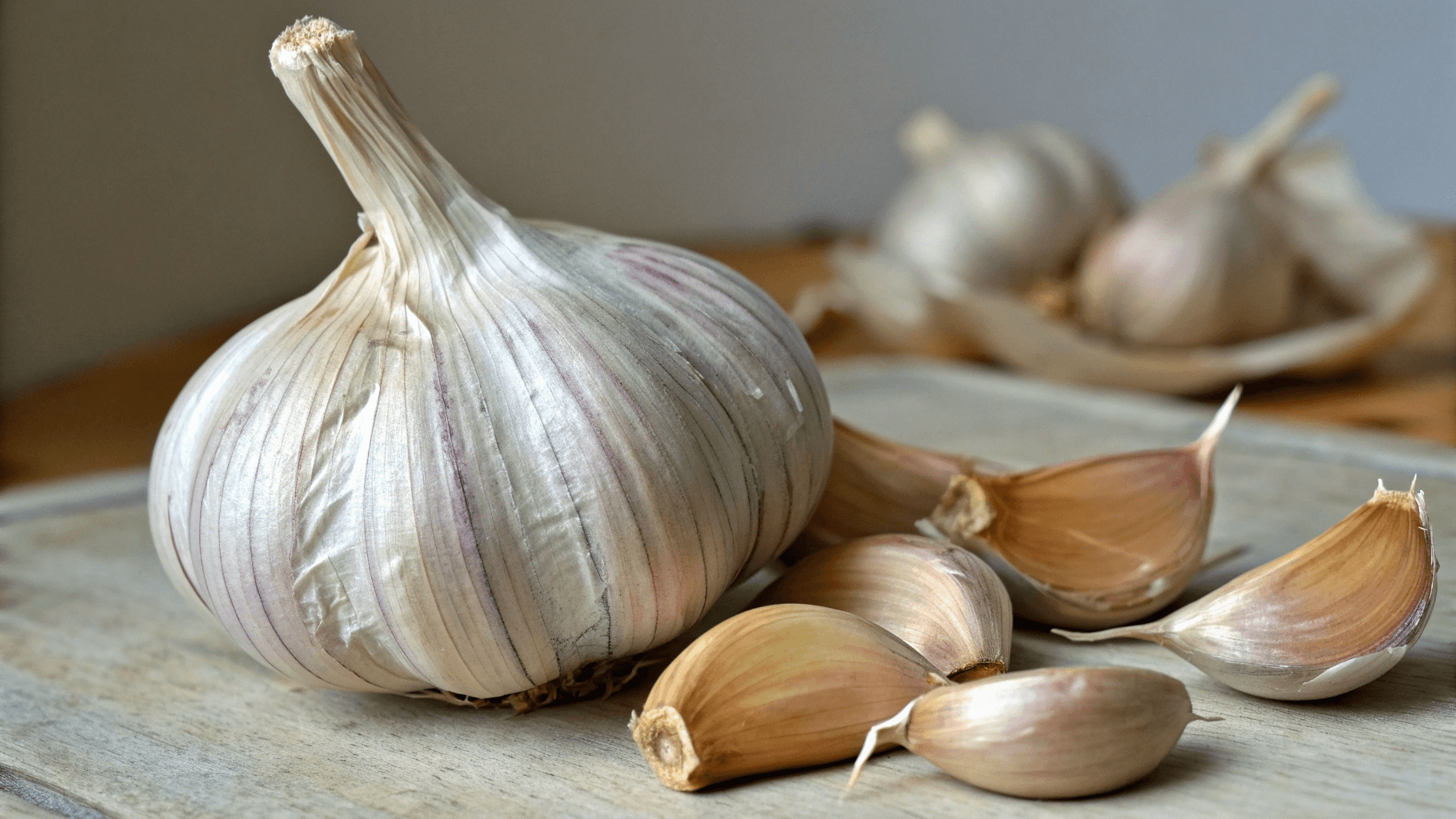
Best for: Southern gardens (Zones 7-10)
Flavor: Mild and smooth
Silver Rose produces smaller cloves but in abundance. It’s a great choice for garlic braids and stores exceptionally well. Its gentle flavor makes it perfect for those who enjoy garlic’s aroma without too much bite.
Growing tip: Silver Rose garlic handles heat well and stores longest when cured thoroughly in a dry, well-ventilated space after harvest.
8. Creole (Softneck)

Best for: Warm, humid climates (Zones 8-11)
Flavor: Sweet heat with a touch of spice
Creole garlics are stunning with their purple-streaked wrappers and thrive where many others fail. They’re a top choice for southern gardeners and are prized for their unique flavor profile, a mix of sweetness and heat that intensifies when roasted.
Growing tip: Creole garlic thrives in warm, humid climates and performs best when planted in raised beds or well-drained soil to avoid excess moisture around the bulbs.
What Garlic Variety Works Best for Your Zone
Choosing the right garlic variety isn’t just about flavor, it’s about matching your climate zone. Garlic needs the right balance of cold exposure and growing time to form large, healthy bulbs.
Use this table to quickly match garlic varieties to your USDA growing zone.
| USDA Zone | Recommended Garlic Type | Suggested Varieties |
|---|---|---|
| Zones 3-5 | Hardneck | Music, German Extra Hardy, Chesnok Red |
| Zones 6-7 | Either (Hardneck or Softneck) | Inchelium Red, Chesnok Red, Silver Rose |
| Zones 8-9 | Softneck | California Early, Creole, Silver Rose |
| Zones 10-11 | Softneck | Creole, California Early |
If you live in a transitional zone (6-7), you have the flexibility to grow both types. Try planting a mix! That way, you can enjoy the bold flavor of hardneck and the long storage of softneck varieties.
How to Choose the Best Garlic Variety for Your Garden
Choosing the best garlic variety comes down to three factors:
1. Your climate – Cold climates favor hardneck varieties, while warm regions perform better with softneck garlic.
2. Your cooking style – If you love bold, spicy garlic, hardneck types shine. For everyday cooking and storage, softnecks are more practical.
3. Storage needs – If you want garlic that lasts all winter, softneck varieties are the best choice.
If you’re unsure, plant both types and see which performs best in your garden.
How to Source Quality “Seed” Garlic
One of the biggest mistakes gardeners make is buying garlic from the grocery store. These bulbs are often treated to prevent sprouting and may carry diseases. For the best results, always buy certified seed garlic from reputable growers.
Where to Buy
- Local nurseries or farmers’ markets: You’ll often find regionally adapted varieties that perform better in your climate.
- Online seed companies: Many trusted suppliers specialize in garlic seed, offering dozens of heirloom options.
When buying, look for:
- Firm, disease-free bulbs with tight wrappers
- Region-appropriate types (ask what grows best locally)
- Named varieties — avoid “generic white garlic”
Also, remember to plant garlic in well-prepared soil and at the right time of year. Most gardeners plant in the fall, giving the bulbs time to root before winter dormancy.
Storing, Feeding and Harvesting for Best Results
Even the best garlic variety won’t reach its potential without proper care. Once your garlic is in the ground, keep the soil moist but not soggy, and fertilize as needed during the growing season.
From experience, consistent moisture in spring makes a noticeable difference in bulb size by harvest time.
For best results:
- Water deeply every 7-10 days in dry weather
- Stop watering about two weeks before harvest
- Feed with a balanced organic fertilizer during spring growth
When the lower leaves start turning brown, it’s time to harvest. Carefully lift bulbs with a garden fork and cure them in a dry, shaded spot for 3-4 weeks.
Conclusion
Choosing the right garlic variety is about more than just planting bulbs; it’s about setting yourself up for success. Whether you’re in the snowy North or the sunny South, there’s a perfect garlic for your garden waiting to be discovered.
If you live in a cold climate, go for the bold flavors and scapes of hardneck garlic. If your winters are mild, softneck varieties will reward you with long-lasting bulbs that keep well through next season.
After growing garlic season after season, I’ve found that good timing and soil preparation matter far more than fancy tools or fertilizers.
Ready to plant? Follow my complete How to Grow Garlic guide for step-by-step planting, care, and harvesting tips.

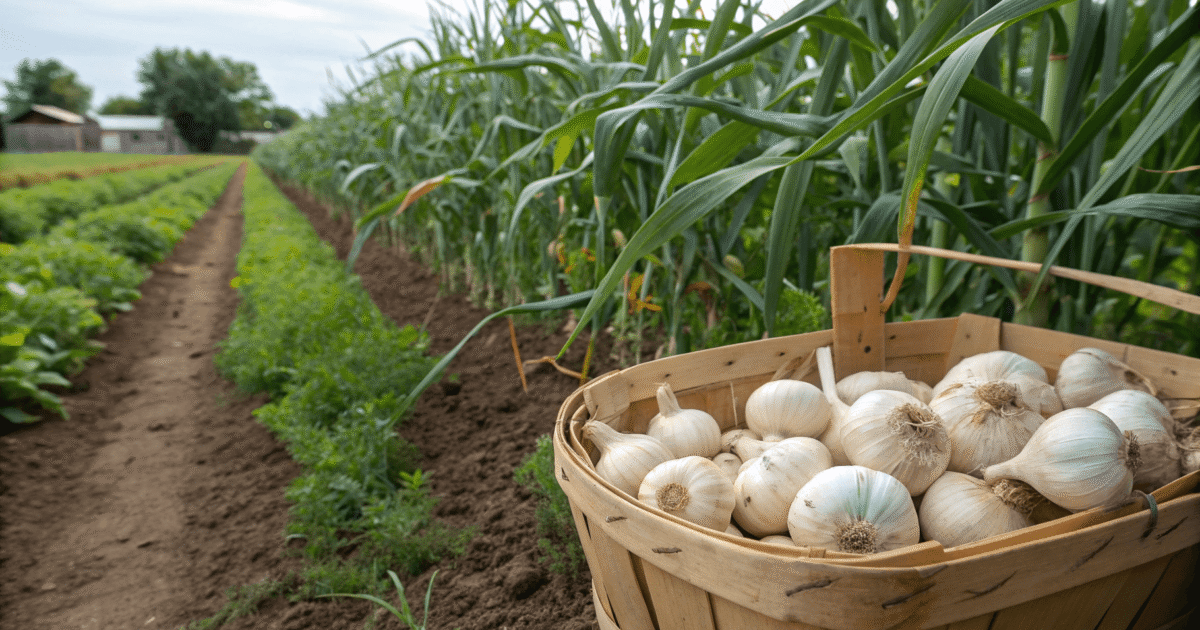

Leave a Reply